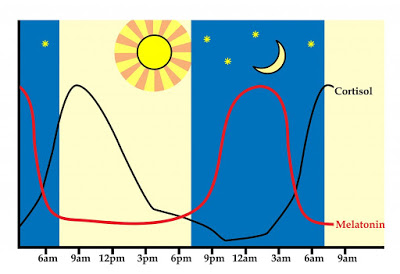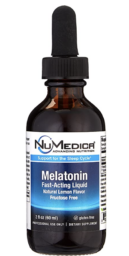
Sleep Issues are Fairly Common
According to the National Institutes of Health, 30% of the population experiences some type of sleep disruption. A 2005 poll by the National Sleep Foundation found that over 50% of people complained of at least one symptom of insomnia a few nights per week within a one-year period. Although the most common symptoms of insomnia are difficulty falling asleep or staying asleep, other symptoms include waking up too early in the morning, feeling unrefreshed after sleeping, and daytime challenges such as cognitive impairment, mood and behavior disturbances, and difficulties with work, school, or interpersonal relationships.
The Circadian Rhythm & Important Hormones

Understanding our natural circadian rhythm, or body clock, is important when trying to improve sleep. Circadian rhythm refers to biological functions naturally occurring in a 24-hour cycle. Humans have a diurnal rhythm which is synchronized with the cycle of day and night. We have a master clock in our brain, known as the SCN, which is a cluster of nerve cells receiving input from the eyes and controlling the production of melatonin, the hormone that makes us drowsy. When there is less light input, the SCN signals for the body to make more melatonin.
Another important hormone that regulates our sleep-wake cycles is cortisol, often referred to as the stress hormone. Cortisol levels naturally peak in the morning around the time we wake up, helping with energy and alertness. At night when we are sleeping, cortisol levels are naturally lower. Stressors, whether physical or emotional, acute or chronic, can affect cortisol levels, which may interfere with sleep.
Sleep Hygiene
As a naturopathic doctor,* my favorite starting point for supporting better sleep naturally is sleep hygiene, which refers to good habits around sleep and our bedroom environment. Check out the lifestyle factors below to promote healthier sleep.
- Keep bedtime and wake time as consistent as possible. Our body clock works best on a regular schedule, and having large swings in bedtime and wake time throughout the week can interfere with sleep. Limiting or avoiding naps can also help, as long daytime naps (>20-30 minutes) can delay sleep onset at night.
- Dim lights in your home as you approach sleep at night. Shut off any overhead or fluorescent lights and use softer sources of light such as lamps to cue melatonin production an hour or so before bedtime.
- Stop using electronics two hours before your bedtime. These devices emit artificial blue light which can suppress melatonin release and lead to a delay in REM sleep, reduced total REM sleep, and less alertness the next day.
- Keep your bedroom as dark as possible, using black out shades or blinds, and cover any electronic light sources or move them to other rooms.
- Get outside and get some exposure to daylight first thing in the morning to help clear melatonin and signal to your body that it is time to wake up. Even if it’s a brief walk to the mailbox, daylight exposure in the morning helps to establish a healthy circadian rhythm.
- Aim for daily exercise, which can have a dramatic effect on sleep. Some people will get too stimulated by exercising in the evening, so find the right time of day for your body. Whenever possible, getting some morning exercise outdoors is a great way to support your circadian rhythm and enjoy the other health benefits of daily exercise.
- Avoid caffeine or other stimulants in the afternoon and evening. Everyone metabolizes caffeine at a different rate, and for those who metabolize it slowly, having caffeine after noon can disrupt sleep at night.
- In addition to keeping your bedroom as dark as possible, create a supportive sleep environment by keeping your bedroom cool and considering ear plugs, a fan, or white noise machine for those who are easily disturbed by sounds.
- Mind-body techniques such as breathing exercises, meditation, or visualization can help manage stress and promote sleep.
If you have already worked on sleep hygiene, but continue to struggle with sleep, here are a few supplements that may help. Check with your healthcare practitioner before starting any new supplements to ensure they are appropriate for you and don’t interact with any medications you are taking.
Integrative Therapeutics Cortisol Manager: During times of increased situational stress, higher cortisol levels in the evening may contribute to sleepless nights. This supplement contains ashwagandha, L theanine, phosphatidylserine, magnolia, and epidium to support healthy evening cortisol levels and promote relaxation.
Xymogen RelaxMax: This pleasant tasting powder contains a blend of relaxing amino acids and minerals to support a calm mind.
Gaia Sound Sleep: This is a blend of calming herbal ingredients such as passionflower, kava kava, and valerian root.
Melatonin supplements are available, though my preference is to first try encouraging our body’s own melatonin production. However, in some cases if sleep challenges persist, melatonin may offer relief. My recommendation is to use melatonin in the lowest effective dose, for the shortest duration necessary, since it is a hormone. Liquid products such as NuMedica Fast-Acting Melatonin or Now Melatonin allow you to start with a low dose (0.5 mg) and titrate up to find the minimum effective dose. Though melatonin is available in many doses in tablet form ranging from 1 to 20 mg, some people respond to very low doses so it is always a good idea to start low and increase as needed.
If your sleep difficulties are not improving over time, I recommend discussing with your primary care doctor, as some sleep troubles are secondary to other medical issues such as thyroid disorders, hormone imbalances, asthma, chronic pain, or sleep disorders such as sleep apnea or restless legs syndrome. Sleep difficulties may also arise from medications, alcohol use, and substance abuse.
To learn more about natural ways to improve your sleep habits or to explore other facets of your health and receive personalized natural wellness solutions, feel free to reach out. I offer both online and in-person consultations.

Amy Tyler, ND* received her Doctorate of Naturopathic Medicine from Bastyr University and also holds a BS in Chemical Engineering from the University of Texas at Austin. As a naturopathic doctor,* she takes the time to listen closely to her clients and to educate them, empowering them to gain a deeper understanding and ownership of their health.
Resources:
www.sleepfoundation.org
www.nigms.nih.gov/Education/Pages/Factsheet_CircadianRhythms.aspx
www.sleepfoundation.org/articles/why-electronics-may-stimulate-you-bed
www.nhlbi.nih.gov/health-topics/insomnia
*Naturopathic Doctors are not currently licensed in the state of Texas. To support licensure efforts please visit www.txand.org.
If you have comments and/or questions about this blog, email us at blog@peoplesrx.com.



